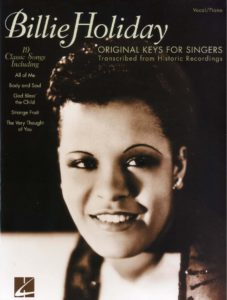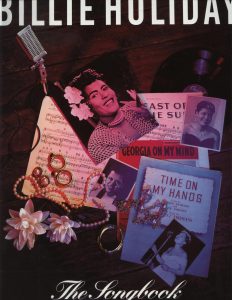Billie Holiday When You’re Smiling with sheet music
“When You’re Smiling” is a popular song written by Larry Shay, Mark Fisher and Joe Goodwin in 1928. It bears resemblance to the Spanish Canción “Amapola” by José María Lacalle García. Early popular recordings were by Seger Ellis (1928), Louis Armstrong (1929), and Ted Wallace & His Campus Boys (1930).
Lyrics
When you’re smilin’
When you’re smilin’
The whole world, it smiles with you
When you’re laughin’
Babe, when you’re laughin’
Well, the sun comes shinin’ throughBut when you’re cryin’
You know you bring on the rain
Stop that sighin’
Be happy againKeep on smilin’
‘Cause when you’re smilin’
The whole world smiles with you
(Ah, let’s go)’Cause when you’re cryin’
You bring on the rain
Stop that sighin’
Be happy againKeep on smilin’
‘Cause when you’re smilin’
The whole world smiles with youWhen you’re smilin’ (when you’re smilin’)
When you’re smilin’ (keep on smilin’)
The whole world, it smiles with you
When you’re laughin’ (keep on smilin’ now)
When you’re laughin’ (you’ll get through somehow)
The sun comes shinin’ through (when I’m with you)But when you’re cryin’
You know you bring on the rain
Stop that sighin’
Come on, be happy againKeep on smilin’
When you’re smilin’, baby
The whole world, it smiles with you
The whole world, it smiles with you
A standard song
“When You’re Smiling” was written by Mark Fisher, Larry Shay and Joe Goodwin. According to Thomas S. Hischak in The Tin Pan Alley Song Encyclopedia, “Seger Ellis popularized the tune, but it was Louis Armstrong who made it a standard.” (Ellis was a songwriter/pianist/vocalist popular in the ‘20s and early ‘30s.) Armstrong first recorded it in 1929 and then again in 1932 and 1956.
His is the version heard in the 1984 film The Cotton Club. The song has appeared in several other films, including Meet Danny Wilson (1952) in which it was sung by Frank Sinatra, and it was the title cut of a 1950 movie in which it was sung by Frankie Laine.
The lyric advocates a cheerful attitude because “when you’re smilin’, the whole world smiles with you.” Conversely, “when you’re cryin’, you bring on the rain.”
“When You’re Smiling” has been recorded by vocalist Eddie Jefferson; the big bands of Count Basie, Stan Kenton, and Duke Ellington; the Dave Brubeck Quartet; saxophonist Art Pepper; guitarist Joe Pass; and many Dixieland groups.
In The Swing Era: The Development of Jazz, 1930-1945, Gunther Schuller highlights Billie Holiday’s recording of the song: “‘Lady Day,’ so named by Lester [Young], and ‘Prez,’ so named by Billie, were obviously musical soulmates and inspired each other…. ‘When You’re Smiling’ (January 1938) is a superior example of their collaboration….”
Recent recordings, however, are sparse. Drummer Bill Stewart and his group of contemporary musicians (Joe Lovano, Dave Holland, and Marc Copland) improvised on it in 1990; trumpeter Warren Vache featured it with the New York City All-Star Big Band in 2000, and Mike Barone’s Big Band recorded it in 2005.

Billie Holiday
Billie Holiday, birth name Elinore Harris, byname Lady Day, (born April 7, 1915, Philadelphia, Pennsylvania, U.S.—died July 17, 1959, New York City, New York), American jazz singer, one of the greatest from the 1930s to the ’50s.
Eleanora (her preferred spelling) Harris was the daughter of Clarence Holiday, a professional musician who for a time played guitar with the Fletcher Henderson band. She and her mother used her maternal grandfather’s surname, Fagan, for a time; then in 1920 her mother married a man surnamed Gough, and both she and Eleanora adopted his name. It is probable that in neither case did her mother have Eleanora’s name legally changed.
The singer later adopted her natural father’s last name and took the name Billie from a favourite movie actress, Billie Dove. In 1928 she moved with her mother from Baltimore, Maryland (where she had spent her childhood), to New York City, and after three years of subsisting by various means, she found a job singing in a Harlem nightclub. She had had no formal musical training, but, with an instinctive sense of musical structure and with a wealth of experience gathered at the root level of jazz and blues, she developed a singing style that was deeply moving and individual.
In 1933 Holiday made her first recordings, with Benny Goodman and others. Two years later a series of recordings with Teddy Wilson and members of Count Basie’s band brought her wider recognition and launched her career as the leading jazz singer of her time. She toured with Basie and with Artie Shaw in 1937 and 1938 and in the latter year opened at the plush Café Society in New York City. About 1940 she began to perform exclusively in cabarets and in concert. Her recordings between 1936 and 1942 marked her peak years. During that period she was often associated with saxophonist Lester Young, who gave her the nickname “Lady Day.”
In 1947 Holiday was arrested for a narcotics violation and spent a year in a rehabilitation centre. No longer able to obtain a cabaret license to work in New York City, Holiday nonetheless packed New York’s Carnegie Hall 10 days after her release. She continued to perform in concert and in clubs outside of New York City, and she made several tours during her later years. Her constant struggle with heroin addiction ravaged her voice, although not her technique.
Holiday’s dramatic intensity rendered the most banal lyric profound. Among the songs identified with her were “Strange Fruit,” “Fine and Mellow,” “The Man I Love,” “Billie’s Blues,” “God Bless the Child,” and “I Wished on the Moon.” The vintage years of Holiday’s professional and private liaison with Young were marked by some of the best recordings of the interplay between a vocal line and an instrumental obbligato.
In 1956 she wrote an autobiography, Lady Sings the Blues (with William Dufty), that was made into a motion picture starring Diana Ross in 1972. Holiday’s health began to fail because of drug and alcohol abuse, and she died in 1959.

Best Sheet Music download from our Library.
Come join us now, and enjoy playing your beloved music and browse through great scores of every level and styles!
Can’t find the songbook you’re looking for? Please, email us at: sheetmusiclibrarypdf@gmail.com We’d like to help you!
